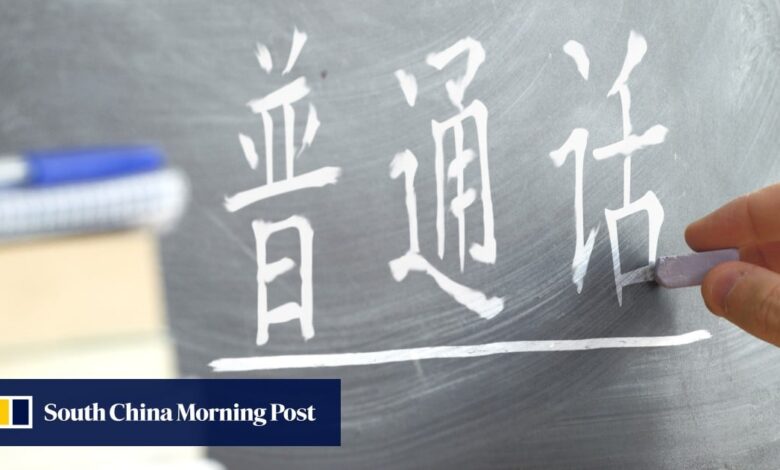Mandarin learning takes off in Rwanda to boost job prospects: ‘it’s the best commercial language’

[ad_1]
“The number of students enrolling at the Confucius Institute has risen over the past decade,” said Dr Beatrice Yanzigiye, 59, director of the institute’s University of Rwanda branch.
The institute – a partnership between the University of Rwanda and China’s Chongqing Normal University – opened its first branch in the central African nation in 2009. A decade later, as many as 5,000 students were enrolled in its Chinese classes, Yanzigiye said.
‘Not the optimal market’, but Africa a place where China firms ‘could survive’
‘Not the optimal market’, but Africa a place where China firms ‘could survive’
Lessons are free for students at the University of Rwanda, while non-students must pay a one-time registration fee of 30,000 Rwandan francs (US$24) to attend classes for two years.
Although the pandemic caused a drop in the number of students from 2020 to 2022, enrolment picked back up after face-to-face lessons resumed in May this year, Yanzigiye said. As of October, there were 780 students learning Chinese.
‘Best commercial language’
One of the students to enrol this year was Peter Ndayishimiye, who works in customer relations at an insurance company. The 22-year-old said he chose to study Chinese because he wants to communicate with an “important Chinese client”.
Ndayishimiye travels directly from work to attend basic Chinese lessons at the institute three times a week. At home, he practises by listening to native speakers on YouTube and watching Chinese dramas. His phone contains a digital version of his textbook so that he can memorise phrases on the go.
“It is not easy, but I want to work hard to learn Chinese,” he said. “It is the best commercial language.”

Ndayishimiye is not the only one who thinks so. As cooperation between the two countries grows, Chinese is gaining prominence in Rwanda as a practical language that can boost business.
Classes at the Confucius Institute sometimes count business executives and government officials among their number, Yanzigiye said.
“The number one motivation for students to learn Chinese is for economic reasons,” said Dr Zeng Guangyu, 40, who is also a director of the institute’s University of Rwanda branch. “More people see that China is growing fast and want to do business with Chinese clients.”
Chinese projects in Rwanda span a wide range of sectors including construction, agriculture, medicine, infrastructure and engineering, according to the Rwanda Development Board. Its figures show that more than 50 Chinese enterprises registered in Rwanda from 2015 to 2019, before the Covid-19 pandemic began.
As more Malaysians learn Mandarin, Chinese schools call for recognition
As more Malaysians learn Mandarin, Chinese schools call for recognition
Some Rwandans entering the workforce also told This Week in Asia they believe fluency in Chinese will boost their employability.
“Once I learn Chinese, I will use it to find jobs in Chinese companies here,” said university student Chafina Cyubahiro. The 21-year-old has been learning Chinese at a Confucius Institute for three months along with a few friends.
Nyandwi Oreste, who also goes by the Chinese name Kong Ze, said his fluency in Chinese had helped him to secure a higher-paying job at a Chinese construction company working on projects in Rwanda.
His monthly salary would have been 250,000 Rwandan francs (US$204) if he had looked for a job without being able to speak Mandarin, the 32-year-old said, adding that he earns 500,000 Rwandan francs a month in his current position.
Studying in China
Oreste studied Chinese at a Confucius Institute for two years and secured the school’s International Chinese Teachers Scholarship to study at Liaoning University in Shenyang in 2019. The scholarship application process required him to sit the Hanyu Shuiping Kaoshi (HSK), China’s standardised test of language proficiency for non-native speakers of Chinese.
“Not a lot of people get this chance,” he said. “They want to keep learning, but not many can qualify for the scholarship money to go overseas.”
The Confucius Institute scholarship offers non-Chinese citizens an opportunity to work in Chinese-language education, or related fields. It covers students’ fees for undergraduate and postgraduate degrees at Chinese universities.
Some thought the Chinese language would die. They were wrong
Some thought the Chinese language would die. They were wrong
According to Zeng, the scholarship is “extremely competitive” as students from Rwanda must contend with applicants from around the world. Official data from the institute showed 14 Rwandans received the scholarship in 2022.
But Zeng said the number of scholarship applicants was rising as more students aimed to move to China and study alongside native speakers.
“These applicants have role models to follow. There are many students whose situations have changed after coming back from China,” he said.
Some have returned from China to become teachers at the Confucius Institute. One of them is Marie Claire, 35, who completed her undergraduate education at Tianjin University on the scholarship.
“I originally wanted to stay on in China to do a master’s degree, but I decided to come back and teach others what I have learned,” said Claire, who works at a construction company by day and teaches basic classes at the institute in the evening.

More Rwandans were showing interest in learning Chinese, she said, including her colleagues at the construction company.
“I feel overjoyed when I can help people understand Chinese,” she told This Week in Asia.
With the rise in student numbers, the Confucius Institute said it was working with its Chinese partners to hire more teachers to meet demand. At least four Rwandan universities requested the institute to start classes there this year, Zeng said, but the institute did not as yet have enough qualified Chinese teachers.
At the end of every class, students rise from their seats and bow to the teacher. Carefully pronouncing each vowel, they chorus xie xie ni and xia ge xing qi jian – Chinese for “thank you” and “see you next week”.
[ad_2]
Source link


